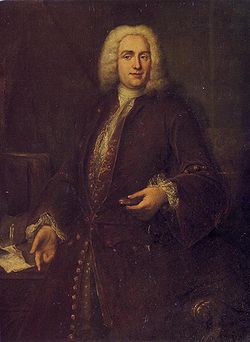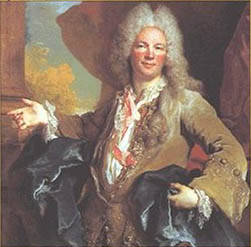<Back to Index>
- Admiral of the Astro - Hungarian Navy Wilhelm von Tegetthoff, 1827
- Composer Joseph Bodin de Boismortier, 1689
- Field Marshal of the Swedish Army Carl Gustaf Wrangel, 1613
PAGE SPONSOR


Joseph Bodin de Boismortier (23 December 1689 – 28 October 1755) was a French baroque composer of instrumental music, cantatas, opéra - ballets, and vocal music. Boismortier was one of the first composers to have no patrons: having obtained a royal license for engraving music in 1724, he made enormous sums of money by publishing his music for sale to the public.
The Boismortier family moved from the composer's birthplace in Thionville (in Lorraine) to the town of Metz where he received his musical education from Joseph Valette de Montigny, a well known composer of motets. The Boismortier family then followed Montigny and moved to Perpignan in 1713 where Boismortier found employment in the Royal Tobacco Control. Boismortier married Marie Valette, the daughter of a rich goldsmith and a relative of his teacher Montigny.
In 1724 Boismortier and his wife moved to Paris where he began a prodigious composition career, writing for many instruments and voices. He was prolific: his first works appeared in Paris in 1724, and by 1747 he had published more than 100 works in various vocal and instrumental combinations. His music, particularly for the voice, was extremely popular and made him wealthy without the aid of patrons. He died in Roissy - en - Brie.
Boismortier was the first French composer to use the Italian concerto form,
in his six concertos for five flutes op. 15. (1727). He also wrote the
first French solo concerto for any instrument, a concerto for cello, viol, or bassoon (1729).
Much of his music is for the flute, for which he also wrote an
instruction method (now lost). His op. 91 for harpsichord obbligato and
flute derives from Rameau's Pieces de clavecin en concerts and is dedicated to the flutist Michel Blavet. A notable piece of Boismortier's that is still often performed is the Deuxieme serenade ou simphonie. The violinist Jean - Marie Leclair the elder (1697 - 1764) cultivated both solo and trio genres with charm although with less profundity. Boismortier and Rameau both lived during the Rococo era of Louis XV and
upheld the French tradition, composing music of beauty and
sophistication that was widely appreciated by the French musical public.
The music theorist Jean - Benjamin de la Borde wrote in his Essai sur la musique ancienne et moderne (Essay on ancient and modern music) in 1780 about Boismortier: Bienheureux Boismortier, dont la fertile plume peut tous les mois, sans peine, enfanter un volume. (Happy be Boismortier whose fertile pen can give birth without pain to a new piece of music every month.)
To such criticism, it is said that Boismortier would simply answer: "I'm earning money."